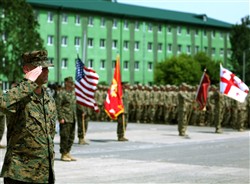Providing communication interoperability to a multi-national force
A noncommissioned officer, second from left, assigned to Special Operations Command Europe Signal Detachment explains how to set up a commercial satellite dish to Polish communications officers on Sept. 24 at the 21st Tactical Airbase in Swidwin, Poland as part of the Jackal Stone 10 exercise. Jackal Stone is an annual international special operations forces (SOF) exercise held in Europe. Its objective is to enhance capabilities and interoperability amongst the participating special operations forces as well as build mutual respect while sharing doctrinal concepts. The exercise, which is coordinated by U.S. Special Operations Command Europe, includes Poland, Lithuania, Latvia, Croatia, Romania, and Ukraine. (U.S. Army photo by Capt. Matthew Songy - photo approved for public release by SOCEUR PAO - MAJ James Gregory)
Related Topics (11)
More related topics
Communicators from seven nations converged on Poland and Lithuania this past September during Exercise Jackal Stone 2010 to develop coalition communication planning techniques and provide a deployable, interoperable communications system for more than 1,100 SOF personnel. Jackal Stone is a multi-national Special Operations Force (SOF) joint exercise led by U.S. Special Operations Command Europe (SOCEUR).
Planners from Poland, Lithuania, Croatia, Romania, Latvia, Ukraine and the United States worked hand in hand to ensure that the most reliable communications support would be provided to the force.
“The importance of NATO and Coalition interoperability can not be emphasized enough,” said Lt. Cmdr. Sean Fischer, a SOCEUR communication planner.
During the week long exercise, communication planners developed ways to improve current procedures by using each nation’s vast experience and knowledge of its own techniques. By the end of the exercise, they had a better understanding of what it takes to provide the necessary planning to support SOF coalition operations. The techniques that were produced can be used in future operations to ensure interoperability between NATO and Coalition SOF.
“Coming here to Jackal Stone was very beneficial for me as I was able to learn a lot, particularly through the working groups,” said Romanian Master Sgt. Aurelian Petrut, who was participating in his first Jackal Stone exercise. “There was a lot of experience in the room as we exchanged ideas with each other.”
Petrut, who serves as a communications sergeant, also mentioned that his experience working with the BICES [Battlefield Information Collection and Exploitation System] would benefit him for future missions in support of ISAF.
“Now I will be able to take what I learned from this training event back to Romania and be able to speak the same ‘language’ at the NATO level,” Petrut added.
Besides developing common understanding on planning techniques and procedures, it is also necessary to be able to share this information with the force in a reliable and responsive manner. Every nation has its own “way” to communicate its information requirements, but when working in a coalition environment you need “one” system to ensure everyone is communicating together.
“We use BICES to communicate securely with our coalition allies and partners,” said Col. Mark Luchs, SOCEUR J-6. “NATO and Coalition SOF needs a reliable and flexible information sharing network to collect, develop and share important information that will be used to develop the plan for engaging and defeating the enemy.”
BICES was employed in three countries at six locations during the exercise, which provided a reliable yet secure communications system in support of SOF operations. United States communications specialists worked side-by-side with their partner nation specialists to provide this robust capability.
“Not all of our partner nations have this deployable capability, so it was an outstanding opportunity for U.S. Forces to train coalition forces on the implementation and capabilities of BICES and develop ‘work-arounds’ for non-NATO partners,” said Luchs.
By the end of exercise Jackal Stone 10, it was very evident that all partner nation SOF communicators had a better understanding of what it takes to work in a coalition/joint interoperable environment.
“This is my third Jackal Stone exercise and by far this has been the best experience because of the outstanding effort displayed by every participating SOF communicator,” said 1st Sgt. Brian Brown, SOCEUR Signal Detachment’s senior noncommissioned officer. “SOF communicators will start planning immediately for next year’s Jackal Stone and no doubt will be implementing the techniques and procedures developed here.”
(Editor’s note – Lt. Col. Pokemire is the SOCEUR J6 Plans & Exercises Division Chief)
Find more articles tagged with:
-
Bulgarian president, senior military leaders visit multinational exercise in Germany
The President of the Republic of Bulgaria visited the Joint Multinational Readiness Center at Hohenfels Training Area to observe Bulgarian Special Forces training during exercise Saber Junction, Oct 19.Find more articles tagged with:
-

Reception Hosted Aboard USS Enterprise
Enterprise has a long relationship with the people of Naples. The carrier made its first ever port visit to the city during its maiden deployment in 1962.Find more articles tagged with:
-

US, Israel prep for largest ballistic missile defense bi-lateral exercise
Senior leaders for the exercise Austere Challenge 2012 announced the arrival of U.S. troops and equipment in Israel for the event and provided background to reporters via telephone Wednesday from Ramstein Air Base, Germany.Find more articles tagged with:
-

Saber Junction tests U.S., partners’ interoperability
Approximately 1,800 forces from 18 European nations train for the post-Afghanistan fight using the U.S. Army’s most-current doctrine for unified land operations. At the Grafenwoehr Training Area, also called GTA, and Hohenfels Training Area, or HTA, and more than 1,300 square miles in-between installation facilities 2nd Stryker Cavalry Regiment, also known as 2CR, engages a complex enemy.Find more articles tagged with:
-

Despite the cold: U.S. military partnerships key to Arctic crisis response
The scenario used during SAREX 2012— a multinational exercise held recently in Greenland’s eastern sea – tested military and civilian capabilities for search and rescue missions above the Arctic Circle. Meanwhile, during exercise Northern Eagle, a U.S. Navy destroyer joined Russian and Norwegian vessels in the Barents Seas to prepare for similar rescues, plus anti-piracy operations and joint air defense.Find more articles tagged with:
-
Civic leaders receive preview of Baumholder's future
Leaders of the U.S. Army Garrison Baumholder, the 170th Infantry Brigade Combat Team and local civic leaders came together for a garrison hosted civic leaders working luncheon recently in the Rheinlander Community Club to discuss issues affecting the military and civilian communities.Find more articles tagged with:
-

USACE forward engineers train with Italians
A U.S. Army Corps of Engineers Forward Engineering Support Team-Advance (FEST-A) conducted training and remote engineering missions in partnership with Italian Army Reconnaissance Engineers here September 9-21, 2012.Find more articles tagged with:
-

EIAMDC officially opens
The Warrior Preparation Center opened the European Integrated Air and Missile Defense Center with a ribbon cutting ceremony here Sept. 26.Find more articles tagged with:
-

Exercise Jackal Stone 2012 leaders, participants honor fallen SF comrade
Military members and civilians from the U.S. and Croatia honored the late Master Sgt. Ivica Jerak, a member of U.S. Army Special Operations Command, with a small memorial service held in his native town of Debeljak, Croatia, Sept. 22, 2012.Find more articles tagged with:
-

Schweinfurt flexes combat capability muscle with NATO exercise
Despite its announced closure earlier this year, the U.S. Army garrison here still has something to prove: Pitted between closing and remaining operational, it can also host a large-scale NATO exercise in its own backyard.Find more articles tagged with:




















Comments: 0